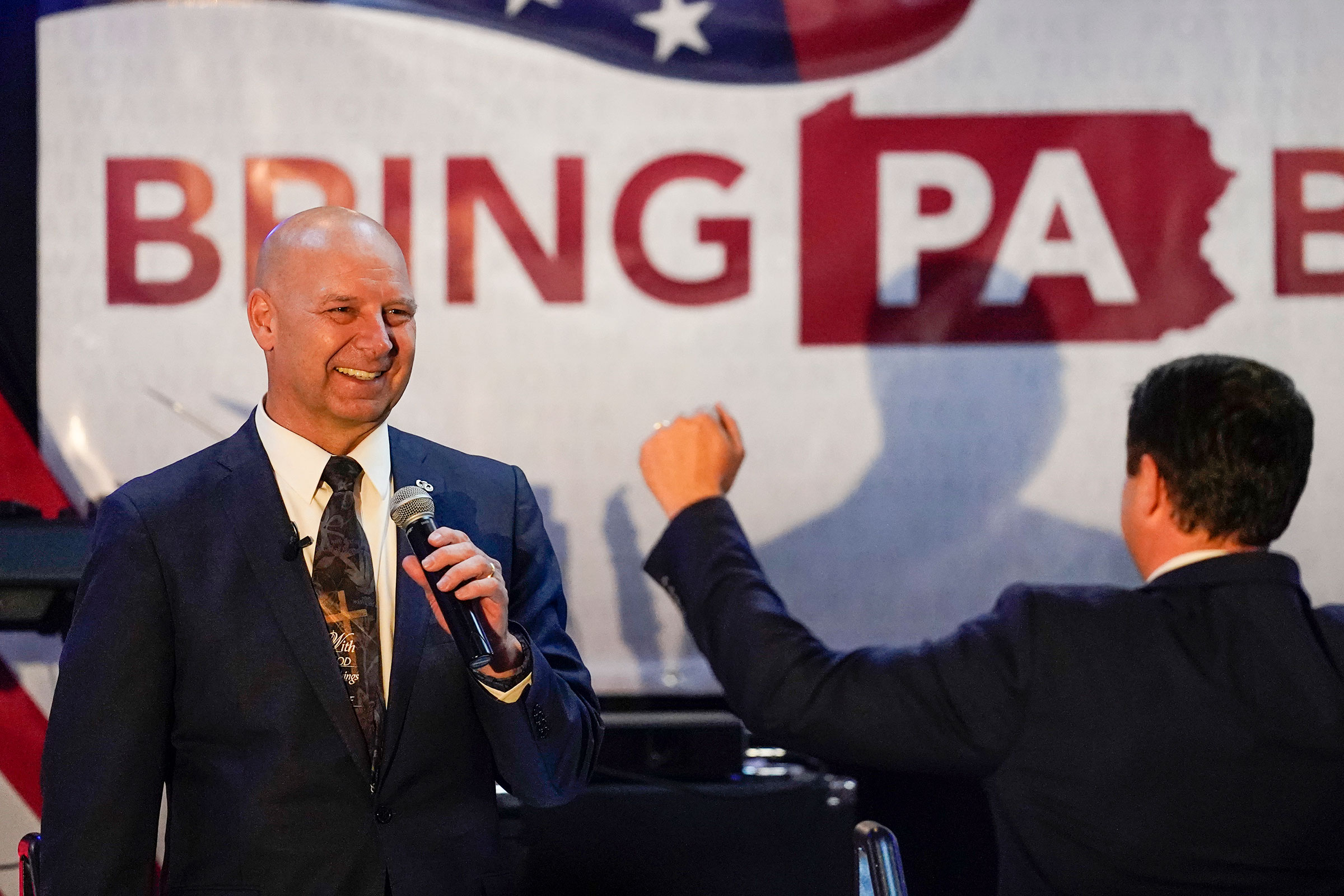
This article is part of The D.C. Brief, TIME’s politics newsletter. Sign up here to get stories like this sent to your inbox.
The Big Lie has legs.
With his wins in Pennsylvania and North Carolina last night, ex-President Donald Trump has more full-throated backers of his erroneous belief that he was the actual winner of the 2020 election within spitting distance of positions where they could actually subvert democracy in 2024. The results in those states’ Republican primaries echo others this cycle, such as Ohio, where Republicans fell in line behind Trump’s fanciful assertion that states and even Congress could choose to ignore the results of the elections.
But Pennsylvania may be the most striking outcome yet, with Republicans handily nominating state Sen. Doug Mastriano in the open race for governor. Mastriano, along with two other prominent Republican candidates for statewide office there, attended the Jan. 6, 2021, Stop the Steal rally in Washington that preceded the failed deadly insurrection at the U.S. Capitol. (He has denied entering the Capitol and the House committee investigating Jan. 6 has subpoenaed him.) Mastriano has also worked in the state legislature to set aside Joe Biden’s victory and has been a tireless apologist for Trump’s efforts to sideline democracy.
As he campaigned to replace Gov. Tom Wolf, who is term-limited, Mastriano promised he would appoint a secretary of state—the top elections administrator—who would force all Pennsylvanians to re-register to vote in the next election, a move that would potentially remake the electorate and would definitely violate federal law.
Still, Pennsylvania Republicans sided with that view, showing just how far the GOP has excused, if not wholeheartedly embraced, the ghastly belief that Trump remains the rightful President.
It was a similar story in North Carolina, where an open race for U.S. Senate led Republicans to nominate Rep. Ted Budd, who joined 138 House colleagues last January in objecting to certify Biden as the winner of the 2020 election. Budd defeated former Gov. Pat McCrory, who refused to repeat Trump’s false claims of victory.
That’s not to say all of the party’s machinery is aligning to support these candidates. The Republican Governors Association, which raises tens of millions of dollars to boost GOP candidates across the country, didn’t pledge to support Mastriano. The RGA’s statement didn’t even congratulate him on his victory in a state that both parties see as a lynchpin to winning the presidency in 2024. Roughly 56% of Republican voters in Pennsylvania cast ballots for other candidates in a crowded field. But politics is ultimately a game of math, and Mastriano won it while strongly suggesting that democracy is for suckers.
The ascendency of this wrong belief that somehow the 2020 election was rigged against Trump is remarkable for a number of reasons. First, it shows just how talented of a salesman Trump remains. He has convinced millions of Americans—and a consistent majority of Republicans—that the election was stolen. Many also believe the deadly riot on Jan. 6 was justified, that the rioters were persecuted, and that a sequel, if warranted, will be more successful. That alone could motivate millions of voters should Trump seek the nomination in 2024. And it shows just how fragile American democracy remains, that if one person with a gift of the gab can inspire thousands to organize an attempted coup, there’s no telling, really, what the limits of civility are in a civil society.
It’s plenty easy for voters in other states to look at Mastriano’s win and shrug it off as something happening over there. But should Matriano prevail in November over the Democrats’ nominee, state attorney general Josh Shapiro, he could have, in effect, veto power over the next presidential election. A hand-picked Big Lie enthusiast installed to run the state’s elections could set aside 19 electoral votes in 2024; John Kerry lost the presidency in 2004 by a margin of one Pennsylvania.
The ripple effects are manifest. If the results don’t actually matter in Pennsylvania, what’s the point in believing in democracy more broadly? Mastriano could dent confidence in the very act of voting, followed by the legitimacy of the government the elections create. It’s not overblown to see the potential for trouble here well beyond the Keystone State’s borders—and this election. This is how today’s Republican Party is choosing its leaders, and it speaks volumes about the moment in this country’s more-fractured-than-ever politics.
Make sense of what matters in Washington. Sign up for the D.C. Brief newsletter.
More Must-Reads from TIME
- How Donald Trump Won
- The Best Inventions of 2024
- Why Sleep Is the Key to Living Longer
- Robert Zemeckis Just Wants to Move You
- How to Break 8 Toxic Communication Habits
- Nicola Coughlan Bet on Herself—And Won
- Why Vinegar Is So Good for You
- Meet TIME's Newest Class of Next Generation Leaders
Write to Philip Elliott at philip.elliott@time.com